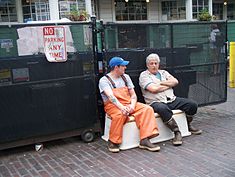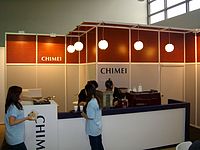- Break (work)
-
"Lunch break" redirects here. For lunch breaks at school, see Recess (break).
A break at work is a period of time during a shift in which an employee is allowed to take time off from his/her job. There are different types of breaks, and depending on the length and the employer's policies, the break may or may not be paid.
Contents
Types of breaks
Meal breaks
Meal breaks or lunch breaks usually range from 30 minutes to one hour. Their purpose is to allow the employee to have a meal that is regularly scheduled during the work day. For a typical daytime job, this is lunch, but this may vary for those with other work hours. It is not uncommon for this break to be unpaid, and for the entire work day from start to finish to be longer than the number of hours paid in order to accommodate this time.
In the United Kingdom the law states that employers are legally required to provide at least a 10-minute break for every four consecutive hours worked and that a person must not work more than four hours in succession. When working in a restaurant environment, staff can be required to work up to six hours straight before having a break but must be given at least 20 minutes break for each six hours worked. Employers are not allowed to make a member of their staff take a break earlier in the shift then work more than four consecutive hours or six consecutive hours in one go without a further break; for example, if an employee was working ten hours the company could not give him twenty minutes' break two hours into the shift and then expect the employee to work the rest of the shift without a further break. This is illegal and could have serious repercussions for the employer.
According to a study, the amount of time people are taking for lunch breaks in the United States is shrinking, thereby making the term "lunch hour" a myth.[1] Some employers request the lunch to be taken at their work station or not offering lunch breaks at all. Many employees are taking shorter lunch breaks in order to compete with other employees for a better position, and to show their productivity.[2]
In some places, such as the state of California, meal breaks are legally mandated.[1] Penalties can be severe for failing to adequately staff one's business premises so that all employees can rotate through their mandatory meal and rest breaks. For example, on April 16, 2007, the Supreme Court of California unanimously affirmed a trial court judgment requiring Kenneth Cole Productions to pay an additional hour of pay for each day that a store manager had been forced to work a nine hour shift without a break.[3]
Restroom/WC breaks
A short break to allow an employee to use a restroom or WC and will generally last less than 10 minutes. Many employers expect their employees to use the facilities during their regularly scheduled breaks and lunches. Denying employees rights to use the facilities as needed could adversely affect workplace sanitation and workers' health and could create legal issues for both these and other reasons.[4] Employers and co-workers often frown on employees who are seen as taking too many of these breaks, and this could be a cause for termination.
Coffee break
- For more see article on Coffee culture.
A coffee break is a routine social gathering for a snack and short downtime practiced by employees in business and industry, corresponding with the Commonwealth terms "elevenses", "morning tea", "tea break", or even just "tea". An afternoon coffee break, or afternoon tea, sometimes occurs as well.
The coffee break allegedly originated in the late 19th century in Stoughton, Wisconsin, with the wives of Norwegian immigrants. The city celebrates this every year with the Stoughton Coffee Break Festival.[5] In 1951, Time noted that "[s]ince the war, the coffee break has been written into union contracts".[6] The term subsequently became popular through a Pan-American Coffee Bureau ad campaign of 1952 which urged consumers, "Give yourself a Coffee-Break — and Get What Coffee Gives to You."[7] John B. Watson, a behavioral psychologist who worked with Maxwell House later in his career, helped to popularize coffee breaks within the American culture.[8]
Coffee breaks usually last from 10 to 20 minutes and frequently occur at the end of the first third of the work shift. In some companies and some civil service, the coffee break may be observed formally at a set hour. In some places, a "cart" with hot and cold beverages and cakes, breads and pastries arrives at the same time morning and afternoon, an employer may contract with an outside caterer for daily service, or coffee breaks may take place away from the actual work-area in a designated cafeteria or tea room.
More generally, the phrase "coffee break" has also come to denote any break from work.
Snack breaks
Snack breaks are usually shorter than meal breaks, and allow an employee to have a quick snack, or to accomplish other personal needs. Similar types of breaks include restroom and smoke breaks. These breaks are also required in the state of California; one 10-15 minute break for every 3.5 hours worked. A few other states have similar laws, but most do not. Some employers allow employees to stop their work for short durations at any time to take care of these needs.
Smoking breaks
Many companies in the 21st century don't allow smoking on their property, although some employers allow workers to leave the premises to smoke, and some jurisdictions have laws prohibiting smoking in an enclosed place where others are employed. Smoke breaks can be of different lengths but for the most part are shorter than lunch breaks. Some employers are very strict about smoking. Alaska Airlines bans smoking and use of tobacco for employees, even outside the workplace.[citation needed] A criticism of smoking breaks is that non smoking employees do not receive the small respite because they simply do not smoke.
See also
- Booster breaks in the workplace
- Workplace strategy
References
- ^ a b Armour, Stephanie (2006-06-12). "Lunch break: Yeah, right". USA Today. http://www.usatoday.com/money/economy/employment/2006-06-11-no-lunch-hour-usat_x.htm.
- ^ Why the lunch break is going extinct - Careers - MSNBC.com
- ^ Murphy v. Kenneth Cole Productions, Inc. 40 Cal. 4th 1094 (2007).
- ^ What Breaks (Rest, Snack, Meals, Smoking, Health, Etc.) Am I Entitled To under FLSA (the Fair Labor Standards Act)?
- ^ "Stoughton, WI - Where the Coffee Break Originated". www.stoughtonwi.com. Stoughton, Wisconsin Chamber of Commerce. http://www.stoughtonwi.com/coffee.shtml. Retrieved 2009-06-11. "Mr. Osmund Gunderson decided to ask the Norwegian wives, who lived just up the hill from his warehouse, if they would come and help him sort the tobacco. The women agreed, as long as they could have a break in the morning and another in the afternoon, to go home and tend to their chores. Of course, this also meant they were free to have a cup of coffee from the pot that was always hot on the stove. Mr. Gunderson agreed and with this simple habit, the coffee break was born."
- ^ Time. 1951-03-05.
- ^ "The Coffee break". npr.org. 2002-12-02. http://www.npr.org/programs/morning/features/patc/coffeebreak/index.html. Retrieved 2009-06-10. "Wherever the coffee break originated, Stamberg says, it may not actually have been called a coffee break until 1952. That year, a Pan-American Coffee Bureau ad campaign urged consumers, 'Give yourself a Coffee-Break -- and Get What Coffee Gives to You.'"
- ^ Hunt, Morton M. (1993). The story of psychology (1st ed.). New York: Doubleday. p. 260. ISBN 0385247621. "[work] for Maxwell House that helped make the 'coffee break' an American custom in offices, factories, and homes."
Categories:
Wikimedia Foundation. 2010.


